Melbourne Storm 1999 grand final hero Tawera Nikau opens up on wife’s suicide and losing his right leg
Tawera Nikau was Melbourne’s hero in the 1999 grand final, but his life would soon be marred by an unimaginable personal tragedy. Hear the former NRL star reveal the emotional untold story of his wife’s suicide and shock amputation of his right leg.
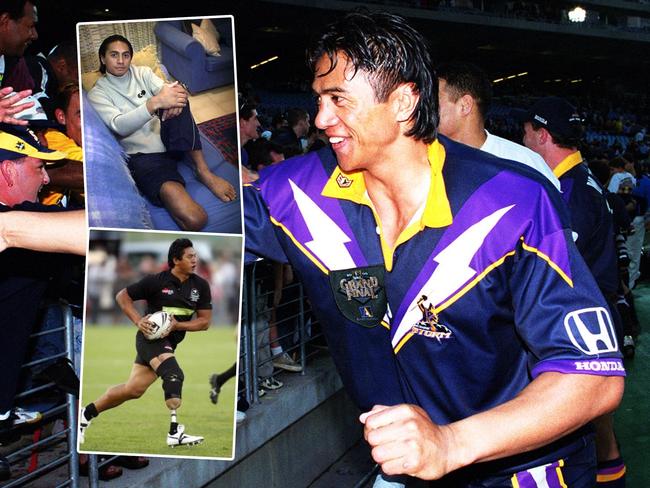
NRL
Don't miss out on the headlines from NRL. Followed categories will be added to My News.
He is the Melbourne Storm grand final hero who told surgeons to cut off his leg so he could raise his heartbroken children.
Haunted by personal tragedy, former New Zealand lock Tawera Nikau has revealed the untold story about his wife’s suicide and shock amputation of his right leg.
Nikau lost his wife, Letitia, in 2001, while a motorbike accident in 2003 left the former Storm and Sharks forward facing an agonising 12 to 18 months in hospital to repair a shattered leg. Aware his two kids, Heaven-Leigh and Tyme, had just lost their mother, Nikau asked the doctor to remove his leg – which meant he could leave hospital just two weeks later to rebuild his family.
“I drive past the cemetery every day where my wife is buried. Not a day goes by when I don’t think about what happened,” Nikau said.
“After losing my wife, losing half a leg was nothing. What doesn’t kill you, makes you stronger. The quality of life you ultimately enjoy isn’t determined by what has happened to you, but by your attitude towards it, and what you decide to do about it.”
Nikau, a Storm old boys’ committee member who will attend Sunday’s grand final against Penrith, now has four different prosthetic legs – one for everyday life and others for running, diving and swimming.
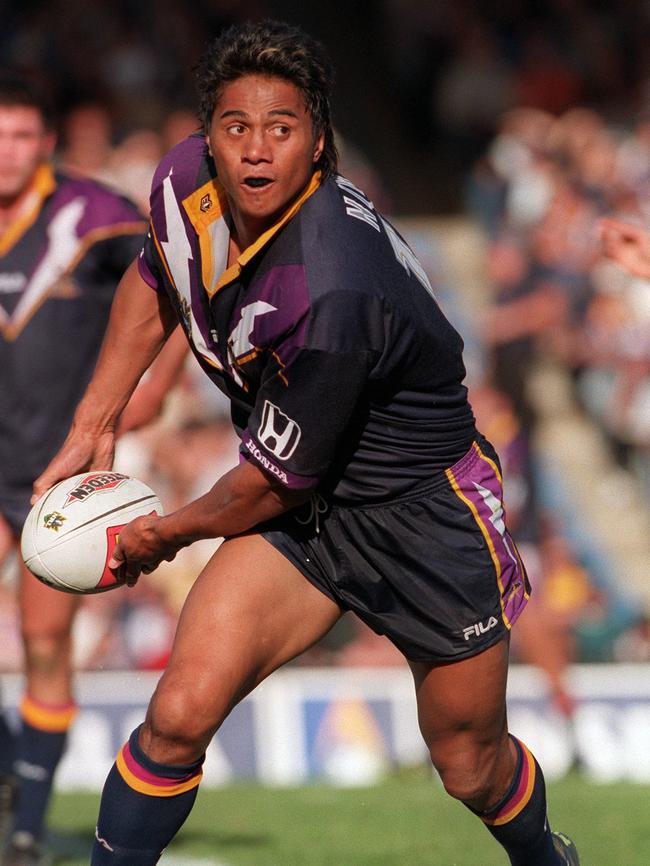
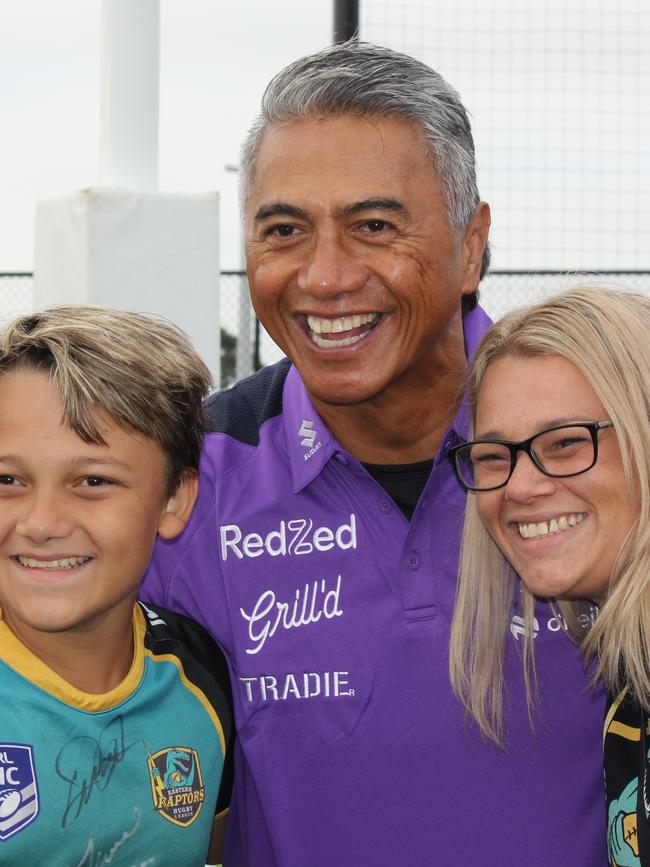
LETITIA’S DEATH
Letitia took her own life when the family were based in northern England. where Nikau was playing for Warrington. Heaven-Leigh was 11 and Tyme just eight.
“I had gone to pick my son up from school – he was at cricket training. I came back home and it had just gone dark but I noticed the light was on in the garage,” Nikau said. “I went around the back to turn the light off and my wife had taken her life. It was the most horrific thing you could ever experience. He (Tyme) didn’t see her, he didn’t.
“It was very traumatic and challenging, bringing up two young children at the time. It was the hardest thing I have ever been through in my life.
“You go through this whole rollercoaster of emotions about what happened – anger, guilt, frustration. For me, it was about trying to get my head around why.
“It came on the back of playing in the grand final for Melbourne. I had gone to England and signed a big deal, was playing at the highest level, captained New Zealand Maori in the 2000 World Cup, everything was perfect, and then all of a sudden your whole world gets taken away from you.
“Letitia was a beautiful mother. My children didn’t want for anything, they had a beautiful lifestyle, travelled the world, so it was hard for them to be bought up without a mum. I was in a dark hole. Losing someone through suicide is tough, but adversity makes you stronger.
“I was lucky because my Warrington coach, (Australian-born) Darryl Van de Velde, who passed away earlier this year, helped me and got some counselling, which got me through it. I am forever grateful to Darryl.”
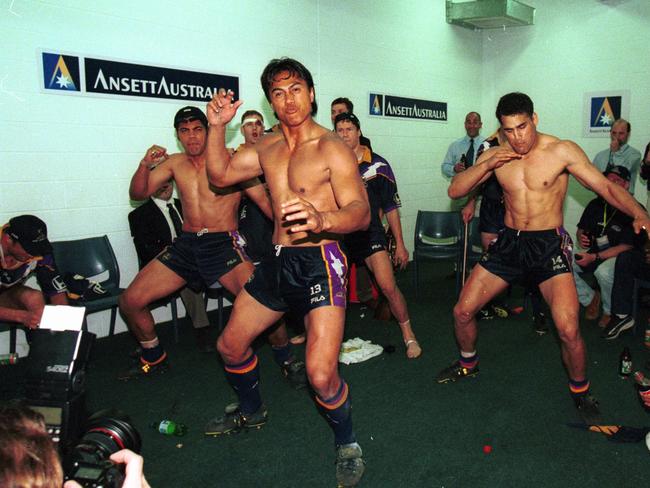
NO ANSWERS
Nikau was in a pre-season training camp shortly before Letitia’s death when her parents visited from New Zealand.
She had an unsettled relationship with her mum and dad.
“I was in Spain with Warrington and her parents had come over for a couple of weeks while I was away. There was something (that happened) in the past. She had a bit of a falling out with her parents,” Nikau said.
“I haven’t got to the bottom of it but some of the stuff with her parents came back (to her) when her mum and dad came over. When I got back to England, she had kicked her parents out and said she didn’t want to see them again.
“I think that triggered some bad things that happened in the past. I told her not to worry about it and that her parents had gone but I hadn’t taken much notice when I went to pick my son up.
“This was 2001 – 23 years ago and people didn’t talk much about depression and suicide. It was all swept under the carpet. I didn’t realise until after it happened that she had suffered from that.
“I came back home to New Zealand for a little while after it happened. Because Letitia was also my manager, she managed my footy career the whole way through, I had to go and finish that contract (at Warrington). That was about honouring my wife. After that last year at Warrington, I never played again.”
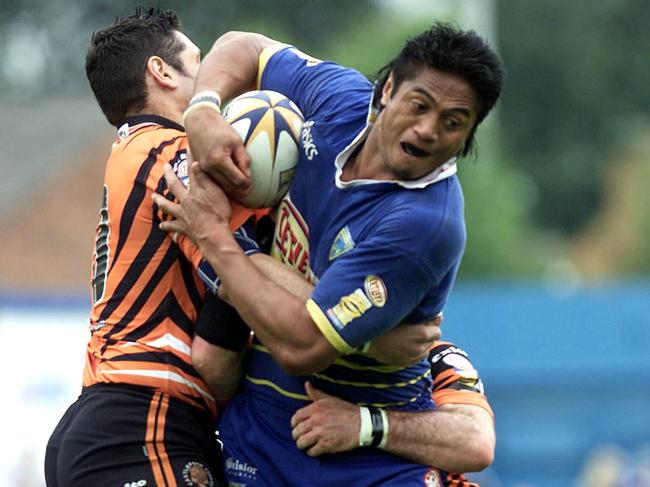
ROAD ACCIDENT
Nikau was riding his Harley-Davidson around Waikato on New Zealand’s north island when his life was sent into a spin once again after a tortuous road accident.
He rejected a long and painful stay in hospital to mend his leg by asking for an amputation below the knee. It meant he could return home quickly to be with his kids.
“I was home (from England) for just over a year and was back at the farm, where I live now, in Huntly. I had grown up riding and racing motocross bikes so when I retired I got a brand new Harley,” he said.
“I had the bike serviced but a guy came around a corner — cutting the corner — and crashed straight into me in a Land Rover.
“I was in hospital for six weeks and had numerous operations and the doctor came in one Friday afternoon and said: ‘Mr Nikau, I’ve got some good news and some bad news’.
“The bad news was that I was going to have to stay in hospital for another 12 to 18 months to try and save my leg. They were going to take some bone off my hip and fuse it to the bottom of my heel, then take some bone off the other hip and put it around my ankle, the bone had gone straight through my ankle, a compound fracture, then take the latissimus muscle off one side of my back and graft it to my ankle, then take the other ‘lat ‘muscle off the other side and graft it around my knee before a skin graft to take all the skin off one side and put it all around my leg.
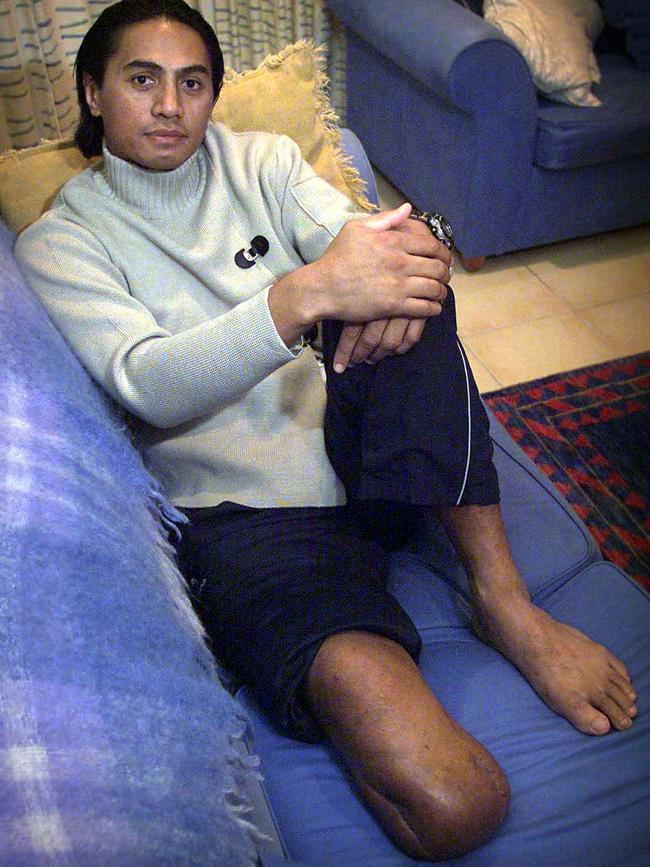
“Even then, they still didn’t know whether I would be able to use the leg or not.
“This happened only 18 months after my wife had taken her life. At the time, my daughter was going on 14 and Tyme was 10 or 11.”
Nikau was potentially going to spend the best part of the next two years in hospital.
“My kids had been through a tough time losing their mum and I didn’t want to be away from them for possibly another 18 months. Who was going to look after them? What would life look like?” he said.
“So I made the decision to get the leg amputated. It was the best thing I ever did. The doctor said: ‘Mr Nikau, if you cut the leg off just below the knee, you’ll be out of hospital in three weeks’. That was the good news.
“My mum was next to me in the hospital and I asked her what I should do. ‘It’s your bloody leg, you can do whatever you want — I told you not to buy that bloody motorbike.’ I got no sympathy.
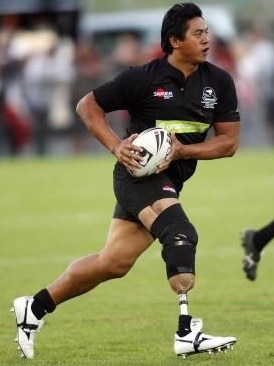
“I was out of hospital within two weeks and running in six to seven weeks. After losing my wife, losing half a leg was nothing. I still go hunting, fishing and everything else. The only thing I can’t do is run as fast as I used to.”
STORM TROOPER
A Storm original from 1998, Nikau played 53 NRL games for Melbourne and 61 matches for Cronulla in a NRL career between 1995 and 1999 before heading to England for a further 259 matches. He also played 19 Tests for New Zealand.
Undoubtedly his greatest moment came in the 1999 grand final when he inspired Melbourne to a famous second-half comeback to defeat St George Illawarra 20-18. Winning a premiership in the club’s second season, after qualifying for the finals in their debut year, remains one of rugby league’s greatest achievements.
“I don’t think anyone has ever done that,” Nikau said. “We had a young bunch of players that wanted to have a crack.”

Storm halfback Brett Kimmorley was awarded the Clive Churchill Medal but only just ahead of Nikau.
Now 57, Nikau is still involved with Melbourne Old Boys committee — along with other former players including Robbie Kearns and Matt Geyer — while continuing to visit the club to speak with young players.
“I am very, very privileged to be part of the inaugural team with John Ribot (CEO) and Chris Anderson (coach) and am also really proud of the current side,” he said.
“I go back and speak to the younger players coming through every couple of years about the culture and history. We tell them why it’s important to be part of the Storm. I’m a life member and get to speak at dinners and inductions.
“When I’m back in Melbourne for life member functions I always pop in and have a chat with Craig (Bellamy) and Frank (Ponissi, Storm football manager). They always ask me to talk to the players.”
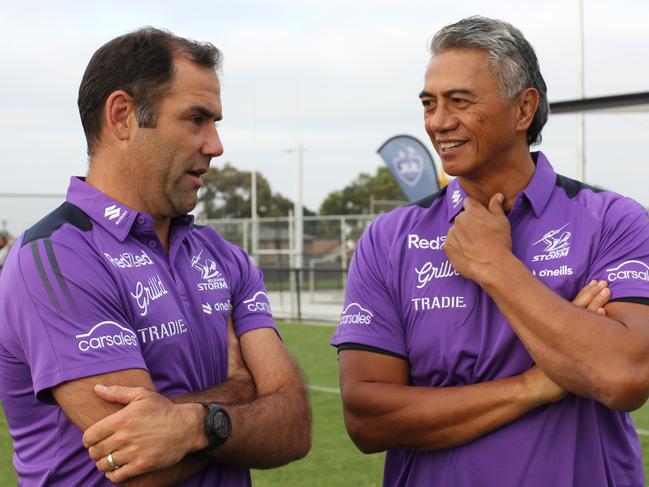
BELLAMY BELIEVER
Nikau knows why Bellamy is a super coach.
“He has a real care factor about his players and the organisation. It’s bigger than themselves,” he said.
“He’s finding players who aren’t superstars but they get the job done. He has that knack of getting the best out of players. Melbourne is a real family orientated club and that is why the old boys are a really important part of the organisation.
“The Bulldogs were a family club and Chris Anderson (ex-Canterbury winger) brought those values to Melbourne and that’s still part of the organisation. We get treated so well by the club. The club has gone to another level.”
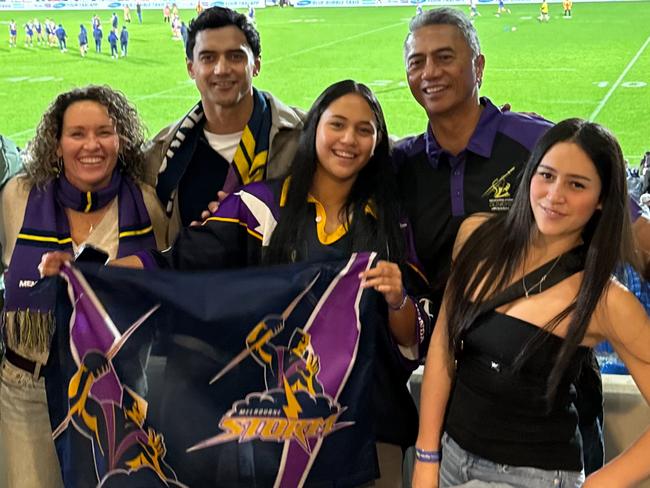
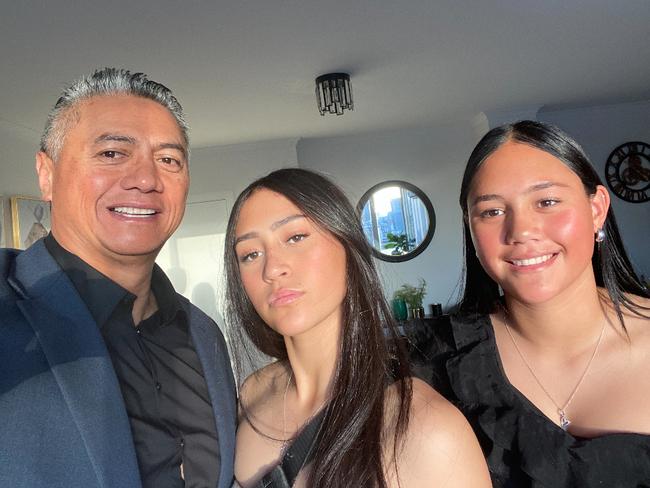
Nikau still lives in Huntly with his new wife Hayley and their two girls, Phoenix, 19, and Nyah, 18.
Nikau, Hayley and Nyah will attend Sunday’s grand final.
“I married a beautiful lady and also have grandkids now,” he said.
“I will be there on Sunday, absolutely. Melbourne was the last team to beat Penrith in a finals game in 2020. Penrith are a machine but I did see a few cracks in their game against Cronulla last weekend.”
Rather than dwell on the bad times, Nikau’s parting words were: “We all go through different challenges. Losing a leg wasn’t going to stop me.”
If you or someone you know may be at risk of suicide, call Lifeline (13 11 14) or the Suicide Call Back Service (1300 659467), or see a doctor
More Coverage
Originally published as Melbourne Storm 1999 grand final hero Tawera Nikau opens up on wife’s suicide and losing his right leg





